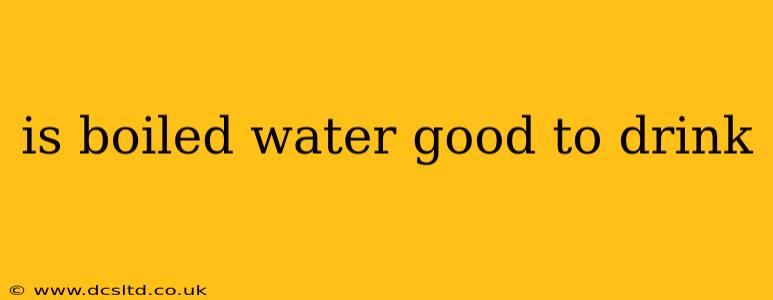Boiled water is generally considered safe to drink, and in many situations, it's the best way to ensure your water is free from harmful contaminants. However, there are nuances to consider. This guide will delve into the benefits, potential drawbacks, and best practices surrounding drinking boiled water.
What are the benefits of drinking boiled water?
The primary benefit of boiling water is its ability to kill harmful microorganisms like bacteria, viruses, and parasites. These pathogens can cause a range of illnesses, from mild diarrhea to severe infections. Boiling water effectively eliminates these threats, making it a reliable method for purifying water, especially in areas with questionable water quality or during emergencies. This is particularly important in developing countries or during natural disasters where access to clean water is limited.
Is it necessary to boil water every time?
Not necessarily. The need to boil water depends entirely on your water source. If you have access to municipal water that undergoes regular treatment and testing, boiling it is usually unnecessary. Many municipal water systems already ensure water is safe for drinking through filtration and disinfection processes. However, if you're unsure about your water source's purity, boiling remains a safe and effective option.
How long should you boil water for?
The Centers for Disease Control and Prevention (CDC) recommends boiling water vigorously for one minute. This ensures that even the most resilient pathogens are killed. At higher altitudes, you may need to boil the water for a slightly longer duration—consult local guidelines for specific recommendations based on your elevation. After boiling, allow the water to cool before drinking.
Does boiling water remove all impurities?
No, boiling water primarily targets biological contaminants. It doesn't remove other impurities like chemicals, heavy metals, or minerals. While boiling eliminates harmful microbes, it doesn't alter the chemical composition of the water. For removing these other impurities, filtration systems, such as activated carbon filters, are generally necessary.
What about the taste of boiled water?
Many find that boiled water has a slightly flat taste compared to unboiled water. This is because boiling can remove some dissolved gases, which contribute to the water's taste. If you find the taste unappealing, letting the boiled water cool and sit uncovered for a while can help to re-aerate it, improving the taste slightly. Adding a slice of lemon or other natural flavorings can also enhance the taste.
Is there a risk of overboiling water?
Overboiling water itself doesn't pose significant health risks, but it can lead to water loss and potentially concentrate minerals. Prolonged boiling can also waste energy. Sticking to the recommended boiling time of one minute is sufficient to kill harmful microorganisms.
Can boiling water damage my kettle?
While infrequent boiling poses no risk, consistently boiling hard water can lead to mineral buildup (scale) in your kettle over time. Regular cleaning and descaling are essential to maintain your kettle's efficiency and lifespan.
Are there any alternatives to boiling water?
Yes, there are other methods for purifying water, including using water filters, water purification tablets, and UV water purifiers. The best method depends on your specific needs and circumstances. For situations where immediate purification is necessary and you have limited resources, boiling remains one of the most effective and readily accessible methods.
In conclusion, boiling water is a safe and effective method for eliminating harmful microorganisms, making it a valuable tool for ensuring clean drinking water, especially when you have concerns about your water source's purity. However, it’s crucial to understand its limitations and consider alternative purification methods if needed to address other potential water contaminants.
